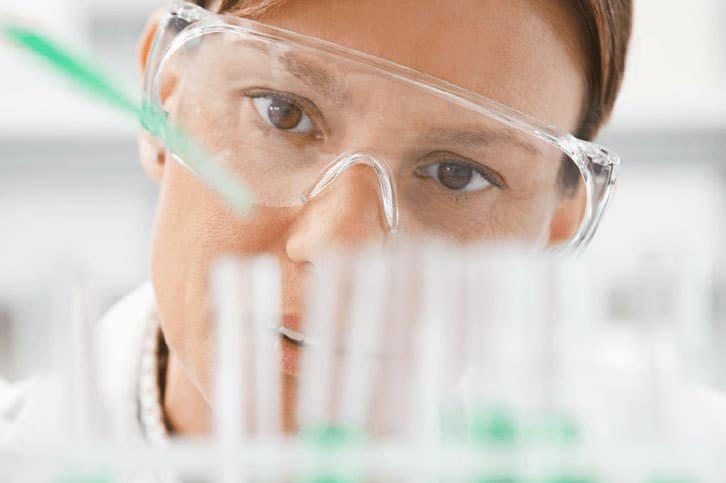Laboratory Technicians assist scientists with research, testing, and conducting experiments. Their tasks can vary greatly between roles but are almost always laboratory-based. They may work alone on specific tasks but are usually part of a larger team.
Laboratory technicians also work in clinical settings, testing samples and providing results to help doctors diagnose patients. They work in hospitals, clinics, physician offices, and reference laboratories. They perform manual tests, use analyzers, interpret results, and maintain and troubleshoot equipment.
In the pharmaceutical industry, Laboratory Technicians work in research and development or production and manufacturing, primarily in laboratories. They are expected to have a good awareness of Good Laboratory Practices (GLP) and techniques but full training is usually given on the specific tasks required for each role.
What does a Laboratory Technician do?
The specific tasks of a Laboratory Technician can vary greatly depending on the laboratory and the types of scientific work conducted there. Generally, a Laboratory Technician supports Laboratory Scientists by performing routine tasks within the laboratory.
All work must adhere strictly to both internal protocols and external regulations.
Examples of tasks include:
- Preparing and carrying out diagnostic laboratory tests.
- Operating and maintaining standard laboratory equipment such as centrifuges, titrators, pipetting machines, and pH meters.
- Taking precise and accurate notes of experiments and results, and sometimes interpreting or presenting those results to senior colleagues.
- Preparing specimens and samples.
- Helping develop new products.
- Supervising experiments.
- Cleaning lab equipment and keeping it in serviceable condition.
- Performing routine maintenance and calibration of laboratory equipment.
- Ensuring the laboratory is well-stocked, resourced, and properly labeled.
- Mixing compounds during the manufacturing process.
- Following strict safety procedures and checks.
- Liaising with laboratory suppliers as required.
Watch this video from Careersnz on a “Day in the Life of a Medical Laboratory Technician”.
Where do Laboratory Technicians work?
Laboratory technicians work in both public and private organisations. These include:
- Large companies in areas such as cosmetics, textiles, metal, oil and plastics
- Hospitals and public health organisations
- Government departments and agencies or government-funded research institutions
- Environmental agencies
- Utility companies
- Forensic science institutions
- Food manufacturing companies
- Pharmaceutical and chemical research companies and organisations
- Pharmaceutical manufacturing companies
- Clinical research and clinical trial companies.
Becoming a Laboratory Technician
The level of education required for Laboratory Technicians varies by role. Some employers may accept an Associate’s degree, while others may prefer a Bachelor’s degree in a science subject such as:
- Biology
- Biomedical science
- Biotechnology
- Chemistry
- Environmental science
- Forensic science
- Materials science/technology
- Pharmacology
- Physics
Having a relevant degree may improve your chances, especially in competitive fields. Generally, a postgraduate qualification is not required.
In some countries, it is possible to become a laboratory technician through an apprenticeship, allowing entry without a degree.
Companies will often provide training for the specific duties they require of employees to ensure they are carried out in full compliance with internal and external regulations.
If you are already a Laboratory Technician but want to retrain for other science roles in Development, Manufacturing, and Quality in the Pharmaceutical manufacturing industry, check out our Conversion Course into Science Roles in Pharma.
Depending on your previous experience, here are some of the most common job titles we see advertised;
- Quality control – Quality Control Associate, QC Associate, Quality Control (QC) Technician, QC Specialist, QC Analyst, QC Scientist, QC Specialist -LIMS
- Quality assurance – Quality Assurance Specialist, QA Associate, Quality Assurance (QA) Technician, QA Specialist, QA Compliance Specialist, QMS/QA Specialist
- Development – Tech Transfer Scientist Jobs, Process Technology Transfer Scientist, Transfer Scientist, Product and Process development scientists
- Science roles that support manufacturing – Microbiology/Particle Analyst, Environmental Microbiologist, Bioprocessing Scientist, Production Scientist, Process Scientist / Specialist – Purification, Process Scientist / Specialist – In-Process Control
What Skills Do I Need?
The ideal skill set for a Laboratory Technician includes:
- Numerical Skills: Essential for running experiments and reporting results accurately.
- Teamwork: Ability to work closely with other team members in a lab-based environment.
- Attention to Detail: Precision in all activities, closely following protocols and quality procedures, and quickly noticing deviations from expected results.
- Hand-Eye Coordination: Necessary for using laboratory equipment, handling samples, and conducting accurate tests.
- Organizational Skills: Running tests methodically and maintaining the overall organization of the laboratory, including supplies and equipment.
- Time Management: Ability to manage multiple projects simultaneously.
- Written Communication Skills: Keeping clear and concise records of laboratory activities and results, in accordance with internal SOPs and external regulatory requirements.
- Calibration and Maintenance: Maintaining and calibrating technical equipment.
- Problem Solving: Learning and applying specific practical techniques to solve technical problems.
Laboratory Technician Salaries & Job Growth
Check out our Salary Guide for Laboratory Technicians for information local to you.
Laboratory Technician Resume Tips
As with all resumes, it’s extremely important that you tailor your Laboratory Technician resume to reflect the language used within the job advert. Where you have relevant experience or skills, use the words and phrases that the employer has used to describe them. Do not assume that someone will read similar wording and know what you mean.
Laboratory Technician roles will typically be looking for the skills previously outlined:
- Numerical Skills
- Team Working
- Attention To Detail
- Hand-Eye Coordination
- Organisational Skills
- Written Communication Skills
For more help with your resume, check out these templates and this list of 30 tips to improve your resume.
What Type of Jobs Can Scientists & Science Graduates Get in the Pharma Industry?
As a science graduate or scientist, you have a wide range of opportunities within the pharmaceutical and medical device industries. With so many options, it can be challenging to determine where to start. Unfortunately, there isn’t a standardized set of job titles across companies, and requirements for similar roles can vary.
Specific opportunities depend on the company and what they manufacture, but some general guidelines can help streamline your search.
Our No.1 piece of advice is to fully read job adverts carefully
Until you fully understand industry opportunities, don’t discount jobs based on their titles alone. Even niche-sounding positions may offer flexibility regarding the degree subject and experience level required. In the pharmaceutical industry, roles are often more about the skills you possess than the exact title of your degree.
For specialist advice based on your degree subject, click on one of the links below:
Laboratory Technician Job Vacancies
For more information on currently available Laboratory Technician roles within the pharmaceutical industry, head to our pharmaceutical jobs board for Ireland and our pharmaceutical jobs board for the UK and select Science in the “Jobs by Category” menu.
Other Science and Quality Roles in Pharma
Manufacturing/Production
- Process Technician
- Process Operator
- Manufacturing Technician
- Production Operator
- Packaging Operator
- Production Supervisor
Engineering
- Process Engineer
- Manufacturing Engineer
- Instrumentation Engineer
- Project Engineer
- Automation Engineer
Maintenance
Quality
Science/Laboratory
Validation
Our Most Popular Programs and Courses
- Good Manufacturing Practice (GMP) Training
- Equipment Validation Training Course – for Starter Validation, CQV and C&Q roles
- Pharmaceutical Validation Training Course – for more Senior Validation, CQV and C&Q roles
- Computer System Validation Course
- View All 13 Pharmaceutical Courses
About the Author
Claire Wilson
Content Marketing and Career Coaching
Claire runs GetReskilled’s Advanced Career Coaching Programme – our specially devised job hunting course that helps our trainees take that final step into employment by leading them through the job hunting process. She is extremely enthusiastic about helping people reach their final goal of employment in their new career path.
Claire has a BSc (Hons) in Medical Biology from Edinburgh University and spent 7 years working in the pharmaceutical and medical device industries.
Donagh Fitzgerald
Head of Marketing & Product Development
Mechanical/Production Engineer
Donagh looks after the marketing and product development including the training and pedagogical elements of our programs and makes sure that all GetReskilled’s users can have a great online learning experience. Donagh has lived and worked in many countries including Ireland, America, the UK, Singapore, Hong Kong and Japan. Donagh has also served as the Program Manager for the Farmleigh Fellowship based out of Singapore.
Donagh holds Degrees in Production Engineering and Mechanical Engineering from South East Technological University, Ireland.



Good